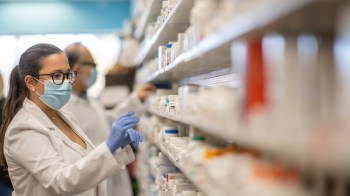What a drug shortage means for pharmacies and consumers
Tess Vigeland: There was another blockbuster merger announcement in the pharmaceutical industry today.
Israel-based Teva — the world’s biggest maker of generic drugs — will acquire Cephalon for almost $7 billion.
While the merger itself is big news, it also plays into another industry story that’s gaining more and more attention, and that’s a growing shortage of some very common prescription drugs. And doctors and nurses across the country are scrambling to find substitutes.
Rob Stein covers the issue in today’s Washington Post and joins us now. Rob, good to talk to you.
Rob Stein: Hi Tess, nice to be here.
Vigeland: So how did this happen?
Stein: It sort of varies from drug to drug, but the main trend that is driving this is that there’s been a consolidation in the pharmaceutical industry, where a lot of companies that had been making some of these mainstay drugs has dropped out, essentially. And now there are only two or three manufacturers for a lot of these really important drugs, and that puts you in a situation where if something happens, where if you have a manufacturing problem, if you can’t get some raw materials, it very quickly spirals into a shortage.
Vigeland: And you’re calling them ‘mainstay drugs.’ From the article, it does sound like these are drugs that are familiar to most of us and certainly in wide use. Give us an idea of which drugs we’re talking about.
Stein: Yeah, we’re talking about some very, very commonly used drugs. For example, morphine — norepinephrine is the drug that doctors use in the emergency room when they’re trying to stabilize trauma patients, for example. There’s also been shortages in several cancer drugs that are used to treat cancer; actually one of the cancer drugs that’s created the most alarm and the most concern is called cytarabine, and it’s used to treat several forms of leukemia and lymphoma and it’s been in acutely short supplies to the point where patients who desperately need it, can’t get it.
Vigeland: Well, so talk to us about what you’re hearing in terms of how these shortages are actually affecting the treatment programs for patients.
Stein: Pharmacists and hospitals around the country are just basically scrambling constantly to keep up with it; they’re checking their emails everyday and they’re learning about new shortages, they’re hunting around for supplies, they’re having to turn to buyers that might be somewhat shady and are charging exuberant prices or maybe even trying to peddle counterfeit drugs. There’s this case in Alabama, a very tragic case, where 19 people became ill and at least nine died because the solution there that was being used in their feeding tubes had become contaminated with a bacteria because the pharmacy that made it was using a substitute that they weren’t familiar with because there was a shortage of the ingredient that they usually use.
Vigeland: Wow. Now in your article, some industry officials blame the FDA in part for the shortages. Why is that?
Stein: Several people I talked to in the industry have said that it is one of the factors that is contributing to these shortages. The FDA’s become much more vigilant about enforcing safety guidelines, to making sure that the drug supply is safe, and when the FDA comes in and finds a problem and shuts down a production line, you know, that’s one of the things that can cause a shortage to occur.
Vigeland: What’s the solution here? What are the FDA and Congress doing to try to get more drugs into the market, make sure this doesn’t happen again?
Stein: Yeah, there’s several things going on. One thing that’s happening is there’s been some legislation introduced in Congress. For example, legislation would require companies to simply notify the FDA when anything happens that might cause a shortage. One of the things that the FDA has been doing to try to deal with some of these shortages is simply finding companies overseas and allowing them to import the drug into the United States. There are other companies, other manufacturers elsewhere where the drug is available, and they can bring it in if they have enough time to arrange that.
Vigeland: Rob Stein is a national science reporter for the Washington Post, focusing on health and medicine. Rob, thanks for talking to us.
Stein: Nice to be here.
There’s a lot happening in the world. Through it all, Marketplace is here for you.
You rely on Marketplace to break down the world’s events and tell you how it affects you in a fact-based, approachable way. We rely on your financial support to keep making that possible.
Your donation today powers the independent journalism that you rely on. For just $5/month, you can help sustain Marketplace so we can keep reporting on the things that matter to you.


















